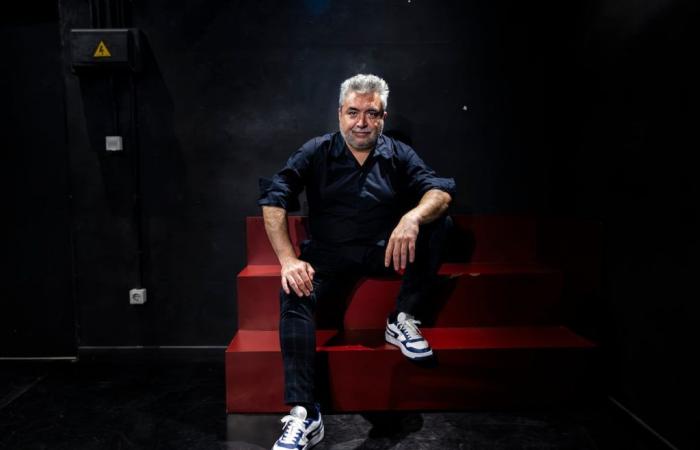
Cristian Alarcón (La Unión, Chile, 54 years old), one of the greatest promoters of the award-winning Latin American chronicle, thanks to texts such as When I die I want them to play me cumbia and the founding of the magazine amphibian, has been turning his work in recent years towards fusion. Between journalism and academia, history and autobiography, the particular and the universal, reality and fiction, journalistic investigation and the arts. The latter is his great bet to tell a “dystopian” present, as he himself refers. So radical and agitated “by the extreme speed of post-capitalism” that the text is no longer enough to narrate it, but rather its dissemination through different creative expressions, mainly the performing arts. To promote his proposal, he has created the Performative Journalism Laboratory, the path towards the objective he pursues, as he has maintained in his conference New narratives of realityheld this Monday night at the Timbre 4 theater in Madrid, and which will be repeated this Tuesday at the Casa Brava bar in the same city.
“Our way of managing stories from amphibian “He moved from the border between journalism and academia to that of art and finally to the stage,” said Alarcón with his Argentine accent, rooted since he went to live in Patagonia when he was six years old to escape with his parents from the Pinochet dictatorship. Why use the resources of art, beyond its appeal to sensitivity and its resilience in moments of historical transformation? Because “there is something in the performative device that makes the stories always alive. Allow them not to die and to congregate again and again,” he responded.
Through the Performative Journalism Laboratory, which since 2018 has promoted the intersection between journalism and creative expressions, chronicles have been dramatized, investigations have been dramatized, and the newspaper archive has been intervened. Answers for a time where “everything is so on the edge that it is impossible to understand and apprehend it.” For Alarcón, the world is going through a historical era due to the overlap of wars, ecological catastrophe and technology.
In this proposal there is Testosterone, a play released this year, where the writer stages his investigation into how hormones were injected into homosexual children when it was considered a disorder. A traumatic experience that Alarcón experienced firsthand from the age of six to eight. “My parents, who lived in a town in the south of Argentina, decided that I was very sissy, I used my mother’s nightgowns and lipstick. The doctor and a psychologist concluded that she needed treatment. My parents now denied everything afterwards, they feigned dementia,” he said in his speech in the small Timbre 4 room, which immediately filled its capacity.
As already happened in his first and so far only novel, The third paradise (winner of the Alfaguara 2022 award), The Chilean author takes his personal, intimate story to make a larger outline and tell an episode of history. If in the book he narrated the life of his grandparents and parents and his passion for gardening to tell the traumatic past of Chile – the 1960 earthquake, the coup d’état – and the history of botany, in Testosterone reveals how hormone treatment began to be applied to gay prisoners in the Nazi concentration camp of Buchenwald and became normalized, because the WHO considered homosexuality a psychiatric illness until 1990.
The piece was presented in January at the Teatro a Mil Festival in Santiago de Chile and in February at the Astros theater in Buenos Aires. It combines autofiction, theater, dance and video art. Furthermore, this investigation from which the play is based will be published as a book in 2025. This particular piece is one of the 14 that have been developed in the Performatic Journalism Laboratory, with productions in Argentina, Chile, Colombia and Spain. Pena and pachanga recreates a Colombian salsa party in Buenos Aires to investigate how migrant communities are built by managing nostalgia, through several interviews with some of the 30 thousand Colombians who live in the Argentine capital.
In Surdelta, The perception of women’s soccer is evident by intervening in packages of World Cup cards with figures of female players. The packages are distributed among parents with small children who are asked to film their children opening it. Meanwhile in The revolution and something delicious for dessert, daughter and mother reflect on the mother-child relationship by intertwining the personal visual archive with the testimony of other women. Alarcón emphasizes that the content of the works is updated with the progress in the investigation and as new functions are mounted. “As in contemporary art, the process is what is important.”
All the culture that goes with you awaits you here.
Subscribe
Babelia
The literary news analyzed by the best critics in our weekly newsletter
RECEIVE IT

